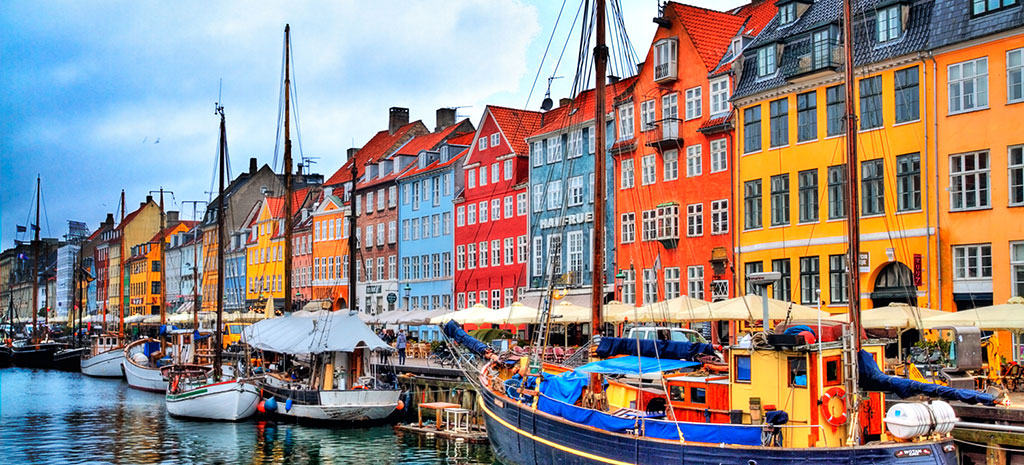
Study in Sweden
Last edited on 04 Mar 2026
Welcome to Sweden!
Sweden, the largest of the Scandinavian countries, is also considered a leader in innovation, ranking in the top 5 countries with most patent requests per capita. Sweden has fostered many internationally known enterprises such as Ericsson, Volvo, IKEA and H&M. Sweden is a world leader in the IT-sector as well as in environmental technology, engineering, medicine and biotechnology. Whether you are just planning a short visit to study in Sweden as an exchange student, studying a master's program or study a full degree, you will benefit from the Swedish open and informal atmosphere, moderate tuition fees as well as the large array of progressive courses you can choose from.
Choose to study in Sweden, and you will find yourself in a nation which has always punched well above its weight. From being the center of an empire in the 17th century, to being the home and birthplace of the Nobel Prize, its influence has long spread well beyond its borders, despite the fact that its total population is no bigger than a large city. Swedish businesses such as Ikea and Volvo are known around the world, and its contributions to popular culture range from bouffant-haired 70s pop aristocrats ABBA to the groundbreaking films of director Ingmar Bergman.
Modern-day Sweden is known for its sense of social justice and fairness. It has the highest level of wealth equality in the world, one of the world’s lowest gender pay gaps, publically funded healthcare for all, and equal rights for homosexual and heterosexual couples. Add on striking northern European beauty, and free tuition for EU students (fees for non-EU students were introduced recently), and the appeal of studying in Sweden is pretty strong.
Higher Education System
Master’s programs are either 1 or 2 years in duration. Entry requirements to master’s programs usually include a bachelor’s degree or equivalent and proficiency in English (TOEFL/IELTS). Currently there are 800+ master’s programs offered in English. A good source of information on higher education in Sweden is the website www.studyinsweden.se. Currently there are around 35,000 international students studying in Sweden. A total of 11 Swedish universities feature in all or one of the three major global rankings, THE, QS and Shanghai/ ARWU. The Karolinska institute (28) is Sweden's highest placed university in the Times Higher Education World University Rankings 2015-2016, followed by Uppsala University (81) and Lund University (90).
Universities in Sweden
Student Cities in Sweden
Stockholm
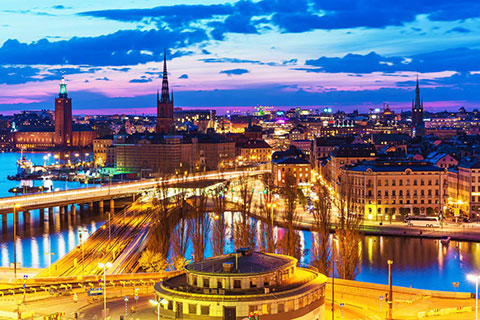
Home to nearly a quarter of Sweden’s population, Stockholm is very much the country’s beating heart. Universities in Stockholm include many of the nation’s most prestigious institutions, such as KTH Royal Institute of Technology, (ranked 97th in the world), Stockholm University (ranked joint 196th) and the Karolinska Institute (in the global top 10 for medicine). Stockholm itself is also the highest-ranking Nordic city in the QS Best Student Cities 2016, in 24th place.
Sweden’s capital is known for its beauty, friendliness, culture and high quality of life. As a student, you’ll have plenty of opportunity to explore Stockholm’s buzzing nightlife, bohemian shops and cafés, or perhaps just take a break from studies by relaxing in the parklands of Djurgården Island. Built on 14 islands connected by 57 bridges, Stockholm is also characterized by the fact that water is never far away.
Gothenburg
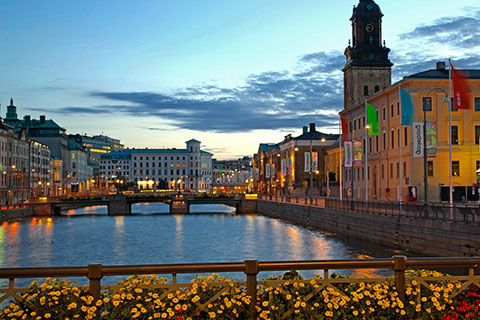
Sweden’s second-largest city, Gothenburg is something of a godsend for those who are not drawn to the quiet, historical, leafy cities in which you’ll find many of Sweden’s universities. Universities in Gothenburg include two high-ranking institutions: the Chalmers University of Technology (ranked 139th in the world) and the University of Gothenburg (joint 264th).
Gothenburg is more affordable than many other Swedish cities, and has plenty of pubs and bars. The port town is also renowned for its continental feel and its friendly locals, and has a charming historical district of its own, so you needn’t feel like you’re missing out. Gothenburg is also featured in the QS Best Student Cities index, at 54th, reflecting the great student experience it has to offer.
Lund
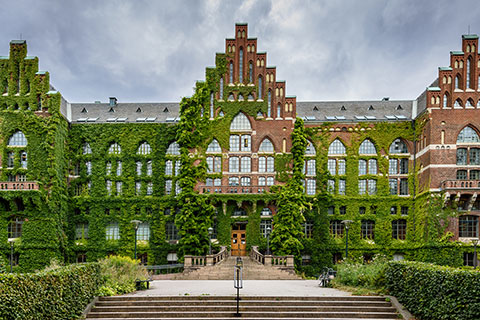
A small and student-centered city, Lund dates back to the 10th century, and is known as something of a hub for high-tech companies, as well as being famed for its excellent university. The second oldest university in Sweden, Lund University is the country’s highest ranking institution, at 73rd in the QS World University Rankings 2016-2017. The city’s position at the southern tip of Sweden means that it also offers plenty of opportunities for travel, making it a good choice for students keen to explore more of Europe in between semesters.
Uppsala
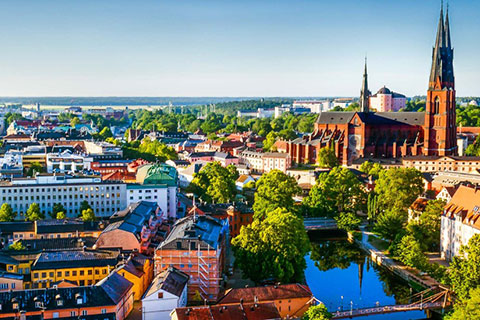
Sweden’s fourth-largest city, Uppsala is a leafy canal-lined city which boasts its very own castle. It’s home to Sweden’s oldest and third-highest ranking institution, Uppsala University (joint 98th in the world). Like Lund, Uppsala appeals not only for the prestige of its university, but also for its lively student community. Though small, both Uppsala and Lund have vibrant student scenes, including opportunities to find student jobs in the bars and other organizations at the heart of student life. Located towards the east of the country, about an hour’s drive north of Stockholm, Uppsala is also well placed for trips to the rest of Europe.
Umeå
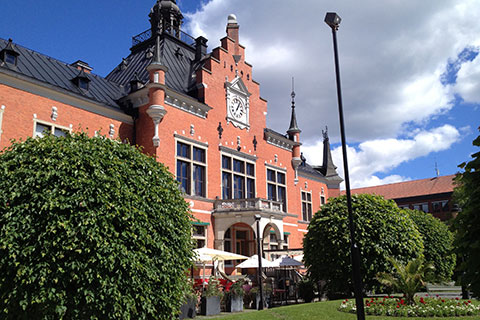
Much further up the eastern coast, Umeå is by far the most northerly of the locations mentioned here, offering a base from which lovers of the wilderness can strike out and enjoy the stark beauty of northern Sweden. If you’re feeling brave, it is a mere 400km from the Arctic Circle. But, though fairly small and remote, Umeå is no backwater. It is known for being something of research hub, with a sizable student population, reasonable nightlife and enough culture to have earned the title of European Capital of Culture in 2014. Umeå University is ranked within the world's top 300, and the city is also home to a branch of the Swedish University of Agricultural Sciences (ranked 7th in the world for agriculture and forestry).
Application, Fees and Visas in Sweden
Swedish university admissions Stockholm view
For Swedish university admissions, you should use the centralized University Admissions application portal, Universityadmissions.se. University is free for Swedish citizens and citizens of EU countries. However, fees have been introduced for non-EU citizens. These are set individually by each university, and you can expect to pay somewhere between SEK90,000 and 150,000 (around US$10,560-17,595) depending on your degree. Non-EU students must also pay an application fee of SEK900 (US$106) – this remains the same no matter how many courses or programs you apply for.
Student visas for Sweden
Student visa requirements for Sweden differ depending on whether or not you are from an EU nation.
EU and Swiss nationals:
You do not need a visa.
Unless you are from a Nordic nation, you will have to register with the Swedish Migration Board within three months of your arrival. This can be done in person, by post or online (note that the Stockholm municipality of Solna has slightly different regulations).
You will need to prove that you have been accepted onto a course, show that you have enough funds to cover your stay and provide evidence that you have acquired health insurance in order to get your registration certificate.
Swiss nationals will also need to get a special residence permit, for which you will need to follow a similar procedure.
If you are not from the EU/EEA: Sweden in winter
You will require a residence permit in order to study in Sweden, which you can get from your local Swedish embassy. The application cost for both student residence permits and a permit to seek employment after completing your studies in Sweden is SEK1,000 (US$117).
In order to obtain a study permit you will need to prove you have been admitted onto a course, that you have comprehensive health insurance and that you can support yourself for the duration of your course. At present, you are required to have SEK8,010 (around US$940) a month for at least 10 months for every year of your stay, in addition to your fees (the first instalment of which must be paid before you’ll receive your permit). You must have enough money for the whole period of study at the time of your initial application. The required amount is reduced if you are receiving free lodging or food, or if you have a scholarship.
You will need to renew your permit annually.
Fast fact
- Constitutional monarchy, currently headed (ceremonially) by King Carl XVI Gustaf
- Democracy, with unicameral legislature (Riksdag)
- Head of government is prime minister (current incumbent is Stefan Löfven).
- Population of approximately 9.38 million people and total landmass of 173,745 square miles, making Sweden one of the most sparsely populated nations in the world
- Member state of the European Union
- Last involved in an armed conflict in 1814, and has since maintained an official policy of neutrality in foreign affairs
- Official language: Swedish (Svensk); many Swedes speak English as a second language
- Capital and largest city: Stockholm
- As well as the famous meatballs, Swedish cuisine includes such delicacies as licorice ice cream and pickled herrings.
- Old Currency: Swedish Krona (SEK)
- Internal dialing code: +46
- Central European Time (UTC+1), switching to Central European Summer Time in summer (UCT+2)
Don’t just pick a place, pick a future they said. Sweden known for being small country in Europe, for being among the wealthiest countries in the world, for excellence in innovation and research. But there are some distinguish things that set Sweden apart from other countries in Europe.
Sweden is green, creative, equal and open. What else? Everyone could speak English! Sweden listed as one of the top countries in the world for non-native speakers of English. That means you don’t have to worry about speaking any Swedish to be able to study here. Public transport is widespread! Extensive network of buses, trains, subways, trams, boats, planes and more in Sweden can take you anywhere you want to go, car-free. International students can definitely work in Sweden. Even though your studies are your number-one priority, as an international students you can work during your stay for studies. There’s no legal limit to the amount of hours. After completing your studies, you can apply to extend your residence permit to look for work for up to six months. After all, Sweden is clean and safe, and the standard of living is high.
Focus Scholarship: Master
Competition: Developing Countries
Scholarship Coverage: Full Scholarship
Swedish government initiates SISS as an international award scheme that focuses to develop future global leaders. The program is funded by the Ministry for Foreign Affairs of Sweden and administered by the Swedish Institute (SI). It offers a unique opportunity for future leaders on professional and academic development, to experience Swedish society and culture, and building a long-lasting relationship with each other. SISS is looking for candidates to play an active role in the positive development of the societies in which they live. Moreover, ambitious young professionals with academic qualifications, demonstrated leadership experience and a clear idea of contribution to their home-country after graduated from Swedish’ university. Priority area of studies: Gender equality, sustainable development, democracy, human rights or poverty reduction. Apply for a scholarship for master’s degree studies in Sweden: develop leadership skills for your contribution to the development of your home country.
Criteria
- Hold a citizenship in one of the partner’s countries.
- Admitted to one of the eligible master programmes in the first selection round at University Admissions
- Applicants must have had at least 3,000 hours’ work experience prior to the scholarship submission. Type of work experience: Full-time employment, Part-time employment, Voluntary work, Paid or unpaid internships, Position of trust (for instance, president at student union). Your work experience can be completed before, during, or after graduating from your undergraduate studies. - Applicants may not have lived for more than two years in Sweden previously, or hold a degree from a Swedish university






